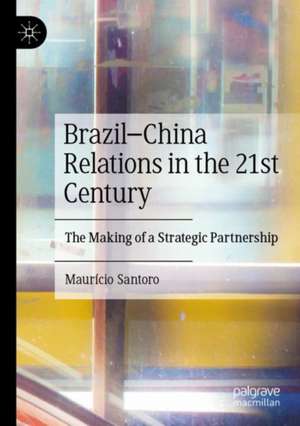Brazil–China Relations in the 21st Century: The Making of a Strategic Partnership
Autor Maurício Santoroen Limba Engleză Paperback – 23 mar 2023
| Toate formatele și edițiile | Preț | Express |
|---|---|---|
| Paperback (1) | 575.27 lei 6-8 săpt. | |
| Springer Nature Singapore – 23 mar 2023 | 575.27 lei 6-8 săpt. | |
| Hardback (1) | 580.49 lei 6-8 săpt. | |
| Springer Nature Singapore – 22 mar 2022 | 580.49 lei 6-8 săpt. |
Preț: 575.27 lei
Preț vechi: 676.79 lei
-15% Nou
Puncte Express: 863
Preț estimativ în valută:
110.09€ • 113.73$ • 91.62£
110.09€ • 113.73$ • 91.62£
Carte tipărită la comandă
Livrare economică 26 martie-09 aprilie
Preluare comenzi: 021 569.72.76
Specificații
ISBN-13: 9789811903557
ISBN-10: 9811903557
Pagini: 118
Ilustrații: XXI, 118 p. 1 illus.
Dimensiuni: 148 x 210 mm
Greutate: 0.18 kg
Ediția:1st ed. 2022
Editura: Springer Nature Singapore
Colecția Palgrave Macmillan
Locul publicării:Singapore, Singapore
ISBN-10: 9811903557
Pagini: 118
Ilustrații: XXI, 118 p. 1 illus.
Dimensiuni: 148 x 210 mm
Greutate: 0.18 kg
Ediția:1st ed. 2022
Editura: Springer Nature Singapore
Colecția Palgrave Macmillan
Locul publicării:Singapore, Singapore
Cuprins
Chapter 1. The Sino-Brazilian Strategic Partnership: In Search of a Multipolar World.- Chapter 2. The Global Commodities Boom and the Sino-Brazilian Trade.- Chapter 3. The Chinese Are Coming: China´s Investments in Brazil.- Chapter 4. China, the Amazon and Climate Diplomacy.- Chapter 5. The Dragon and the Captain: China in the perspective of Brazil´s nationalist right.
Notă biografică
Mauricio Santoro is Assistant Professor at the State University of Rio de Janeiro, where he was twice the head of the Department of International Relations. He has written over 40 academic papers/book chapters and the book “Ditaduras Contemporâneas”, and is a frequent contributor to international media outlets such as BBC, Guardian, New York Times, South China Morning Post, Washington Post, Xinhua.
Textul de pe ultima copertă
“In the mid-seventies, Brazil’s right-wing dictatorship, fresh from destroying a maoist insurgency, established diplomatic ties with Mao’s China. By then, Chinese communists were interested in learning from Brazil’s industrialization strategy without running into the same bottlenecks that locked Brazil in the “middle-income trap”. Almost thirty years later, a China-fueled commodities boom helped Brazil’s anti-poverty efforts achieve extraordinary results. Another fifteen years go by, and now Brazil is ruled by a far-right president who uses China-bashing to fire up its base. Throughout this whole story, Brazil is still in the middle-income trap, China is still ruled by the Communist Party, and both countries are interlocked in investment projects in the Amazon. Santoro’s book provides extraordinary insight into how this story of globalization built from the south unfolded, and the problems that may emerge from it.”
– Celso Rocha de Barros, political columnist at Folhade São Paulo
This book explores the bilateral relationship between Brazil and China in modern history, environment, economics, and contemporary Brazilian politics. As China has become Brazil's largest trading partner, importing commodities and exporting manufactures, and a major investor in the country, Brazil's social structure has been upended, with traditional hierarchies jolted and new ones created- in the agribusiness, industry, in the diplomacy of climate change in the Amazon and not least, Brazil's traditional relationship with the United States. In this incisive text, one of Brazil's leading political scientists explores how China, the X factor of international relations, can transform a nation's politics; it will be of interest to economists, scholars of geopolitics, of China's Belt and Road Initiative and of Latin America politics.
Mauricio Santoro is Assistant Professor at the State University of Rio de Janeiro, where he was twice the head of the Department of International Relations. He has written over 40 academic papers/book chapters and the book “Ditaduras Contemporâneas” and is a frequent contributor to international media outlets such as BBC, Guardian, New York Times, South China Morning Post, Washington Post, Xinhua.
– Celso Rocha de Barros, political columnist at Folhade São Paulo
This book explores the bilateral relationship between Brazil and China in modern history, environment, economics, and contemporary Brazilian politics. As China has become Brazil's largest trading partner, importing commodities and exporting manufactures, and a major investor in the country, Brazil's social structure has been upended, with traditional hierarchies jolted and new ones created- in the agribusiness, industry, in the diplomacy of climate change in the Amazon and not least, Brazil's traditional relationship with the United States. In this incisive text, one of Brazil's leading political scientists explores how China, the X factor of international relations, can transform a nation's politics; it will be of interest to economists, scholars of geopolitics, of China's Belt and Road Initiative and of Latin America politics.
Mauricio Santoro is Assistant Professor at the State University of Rio de Janeiro, where he was twice the head of the Department of International Relations. He has written over 40 academic papers/book chapters and the book “Ditaduras Contemporâneas” and is a frequent contributor to international media outlets such as BBC, Guardian, New York Times, South China Morning Post, Washington Post, Xinhua.
Caracteristici
Explores the role China has played in Brazil's COVID era politics Interrogates the role of commodities in Sino-Brazilian trade, and the environmental issues that arise Provides a new framework for understanding nationalist politics in a changing world
